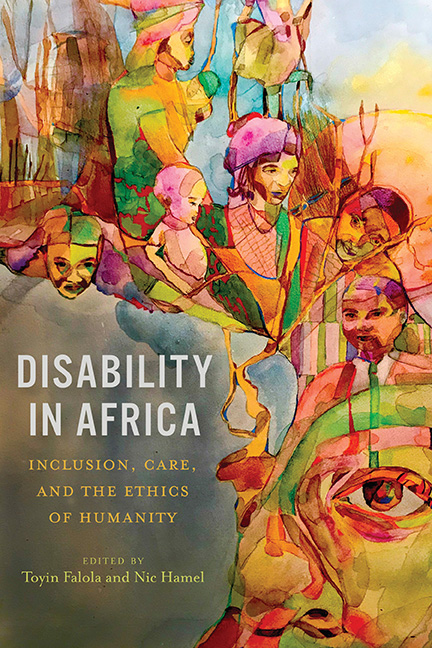Book contents
- Frontmatter
- Dedication
- Contents
- Part One Introducing the Field
- Part Two Theorizing Disability in Africa
- Part Three Representation and Cultural Expressions
- Part Four Education, Community, and Caregiving
- Part Five Activism and Barriers to Inclusion
- Conclusion: A Research Agenda for African Disability Studies
- Selected Bibliography
- Notes on Contributors
- Index
1 - Africanizing Disability: Toward an Articulation of African Disability Studies
Published online by Cambridge University Press: 17 June 2021
- Frontmatter
- Dedication
- Contents
- Part One Introducing the Field
- Part Two Theorizing Disability in Africa
- Part Three Representation and Cultural Expressions
- Part Four Education, Community, and Caregiving
- Part Five Activism and Barriers to Inclusion
- Conclusion: A Research Agenda for African Disability Studies
- Selected Bibliography
- Notes on Contributors
- Index
Summary
That impairment is an actual or potential condition of all living bodies in all places is indisputable. The way that societies treat people with impairments certainly varies, but as disability studies scholars have repeatedly illustrated, the overwhelming tendency is to treat those with impairments poorly. And social mistreatment can be as disabling, if not more so, than physical or mental impairments themselves. To address the forms of disablement that Africans face requires confronting a variety of challenges to social acceptance that arise from specific conditions of history, geography, and economic factors. Among the most prominent challenges to disabled Africans are indigenous, colonial, and postcolonial stigmas, legacies of armed conflict, dense urban zones, vast rural areas, epidemiological risks, misplaced governmental and humanitarian priorities, as well as financial exploitation and underdevelopment. However, Africa has also seen prominent social mobilizations of disabled people who have secured substantial, if still incomplete, gains across the continent. Most African nations now formally acknowledge the special status of disabled people. Aid organizations operating in Africa are beginning to incorporate more socially conscious approaches to disability. Africans’ own communalist traditions and practices are enabling more social inclusion for people with disabilities. An African approach to disability combines the insights of disability studies with the actual contexts of African experiences and acknowledges both how Africa creates problems for traditional disability studies approaches, even as it also offers exciting new potentialities.
Disability studies as an academic discipline emerged in the late twentieth century as an arm of the Anglo and European political movements for disability empowerment. However, tools developed in the minority world left disability scholars unequipped to fully address lived experiences of disability in low- and middle-income countries where “exclusion and inaccessibility are by no means unique to people with disabilities.” Recent attention has been paid to the process of “globalizing” disability studies by recognizing the particular challenges of disability in the Global South. From this process, a field is emerging that combines issues of debilitation, development, and humanitarian policy with traditional disability studies critiques of stigma, ostracization, and disempowerment.
- Type
- Chapter
- Information
- Disability in AfricaInclusion, Care, and the Ethics of Humanity, pp. 1 - 46Publisher: Boydell & BrewerPrint publication year: 2021



